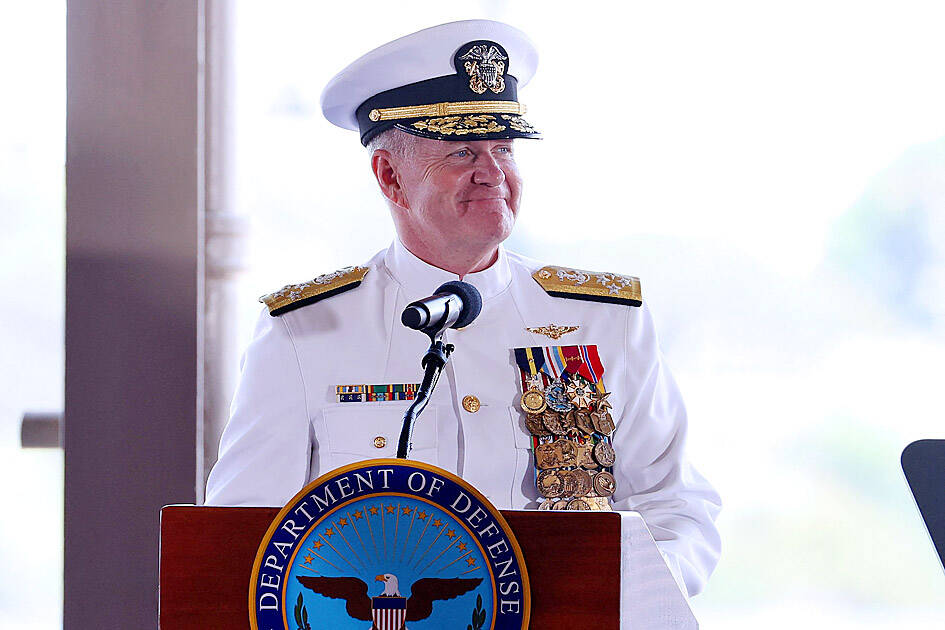The US plans to deploy thousands of drones in the Taiwan Strait in an operation called “Hellscape” to ensure that any attempt by China to invade Taiwan does not succeed, US Indo-Pacific Commander Admiral Samuel Paparo told the Washington Post.
In an article published on Monday, columnist Josh Rogin quoted Paparo as saying from the sidelines of the recent Shangri-La Dialogue defense forum in Singapore that the “Hellscape” strategy would involve deploying thousands of uncrewed submarines, surface vessels and aerial vehicles around Taiwan to buy the nation, Washington and its partners time to assemble a response.
The plan was devised to deter Chinese President Xi Jinping (習近平), who is likely hoping to mount an overwhelming attack with little warning to avoid a protracted war of attrition similar to Russian President Vladimir Putin’s invasion of Ukraine, the column quoted Paparo as saying.

Photo: AFP
“I want to turn the Taiwan Strait into an unmanned hellscape using a number of classified capabilities,” he said. “So that I can make their lives utterly miserable for a month, which buys me the time for the rest of everything.”
While he said it could not reveal the details of the plan, the US Department of Defense in March announced “Replicator,” a US$1 billion initiative to manufacture thousands of “attritable autonomous systems.”
Paparo said that the initiative was based on the lessons the US has learned from Russia’s invasion of Ukraine.
However, drones alone would not be enough to match the Chinese People’s Liberation Army’s buildup of forces with an estimated US$700 billion annual military budget, he said.
The US Indo-Pacific Command was US$11 billion short of the funding it needs for this year, the article said, citing a letter by Paparo’s predecessor to the US Congress in March.

Beijing could eventually see a full amphibious invasion of Taiwan as the only "prudent" way to bring about unification, the US Department of Defense said in a newly released annual report to Congress. The Pentagon's "Annual Report to Congress: Military and Security Developments Involving the People's Republic of China 2025," was in many ways similar to last year’s report but reorganized the analysis of the options China has to take over Taiwan. Generally, according to the report, Chinese leaders view the People's Liberation Army's (PLA) capabilities for a Taiwan campaign as improving, but they remain uncertain about its readiness to successfully seize

Taiwan is getting a day off on Christmas for the first time in 25 years. The change comes after opposition parties passed a law earlier this year to add or restore five public holidays, including Constitution Day, which falls on today, Dec. 25. The day marks the 1947 adoption of the constitution of the Republic of China, as the government in Taipei is formally known. Back then the Chinese Nationalist Party (KMT) governed China from Nanjing. When the KMT, now an opposition party in Taiwan, passed the legislation on holidays, it said that they would help “commemorate the history of national development.” That

Taiwan has overtaken South Korea this year in per capita income for the first time in 23 years, IMF data showed. Per capita income is a nation’s GDP divided by the total population, used to compare average wealth levels across countries. Taiwan also beat Japan this year on per capita income, after surpassing it for the first time last year, US magazine Newsweek reported yesterday. Across Asia, Taiwan ranked fourth for per capita income at US$37,827 this year due to sustained economic growth, the report said. In the top three spots were Singapore, Macau and Hong Kong, it said. South

Snow fell on Yushan (Jade Mountain, 玉山) yesterday morning as a continental cold air mass sent temperatures below freezing on Taiwan’s tallest peak, the Central Weather Administration (CWA) said. Snowflakes were seen on Yushan’s north peak from 6:28am to 6:38am, but they did not fully cover the ground and no accumulation was recorded, the CWA said. As of 7:42am, the lowest temperature recorded across Taiwan was minus-5.5°C at Yushan’s Fengkou observatory and minus-4.7°C at the Yushan observatory, CWA data showed. On Hehuanshan (合歡山) in Nantou County, a low of 1.3°C was recorded at 6:39pm, when ice pellets fell at Songsyue Lodge (松雪樓), a